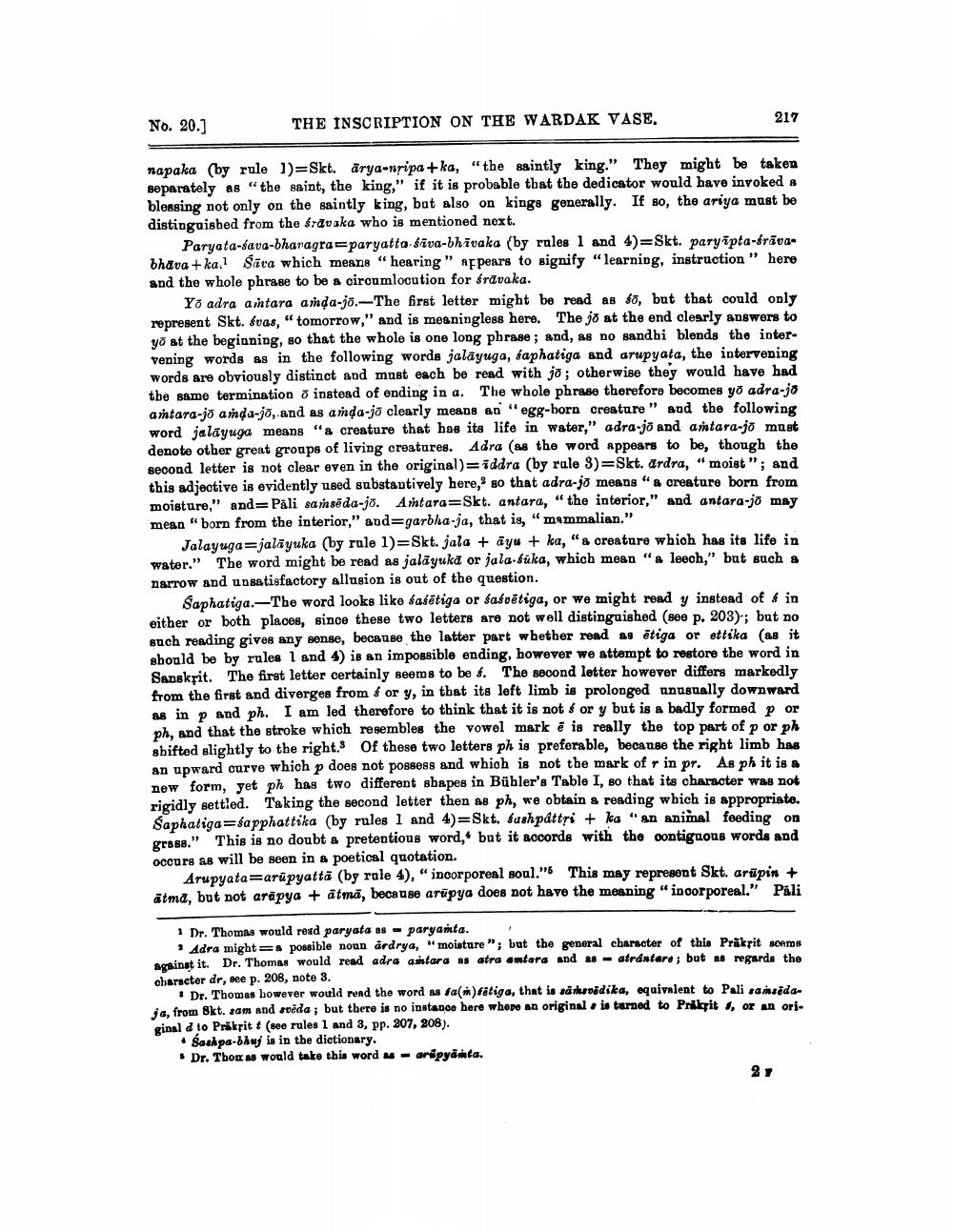________________
No. 20.]
THE INSCRIPTION ON THE WARDAK VASE.
217
napaka (by rule 1)=Skt. arya-nripa+ka, "the saintly king." They might be taken separately as "the saint, the king," if it is probable that the dedicator would have invoked a blessing not only on the saintly king, but also on kings generally. If so, the ariya must be distinguished from the śdvaka who is mentioned next.
Paryata-sava-bharagrasparyatto sīva-bhīvaka (by rules 1 and 4)=Skt. paryipta-śrāvan bhava +ka. Sāra which means “hearing" appears to signify "learning, instruction " here and the whole phrase to be a circumlocution for fravaka.
Yo adra aitara anda-jo.-The first letter might be read as $0, but that could only represent Skt. Svas, “ tomorrow," and is meaningless here. The jo at the end clearly answers to yo at the beginning, so that the whole is one long phrase ; and, as no sandhi blends the intervening words as in the following words jalāyuga, saphatiga and arupyata, the intervening words are obviously distinct and must each be read with jo; otherwise they would have had the same termination o instead of ending in a. The whole phrase therefore becomes yo adra-jo antara-jo anda-jo, and as amda-jó clearly means an "egg-horn Creature" and the following word jalāyuga means "a creature that has its life in water," adra-jo and antara-jo must denote other great groups of living creatures. Adra (as the word appears to be, though the second letter is not clear even in the original)= iddra (by rale 3)=Skt. drdra, "moigt"; and this adjective is evidently used substantively here, so that adra-jo means "& creature born from moisture," and= Päli samsöda-jo. Antara=Skt. antara, "the interior," and antara-jo may mean "born from the interior," and=garbha-ja, that is, "mammalian."
Jalayuga=jalāyuka (by rule 1)=Skt. jala + āys + ka, "a creature which has its life in water.” The word might be read as jalāyukā or jala-fuka, which mean "a leech," but such a narrow and unsatisfactory allusion is out of the question.
Saphatiga.-The word looks like casētiga or sašvētiga, or we might read y instead of 6 in either or both places, since these two letters are not well distinguished (see p. 203); but no ench reading gives any sense, because the latter part whether read as ētiga or ettika (as it should be by rules 1 and 4) is an impossible ending, however we attempt to restore the word in Sanskrit. The first letter certainly seems to be f. The second letter however differs markedly from the first and diverges from $ or y, in that its left limb is prolonged anngually downward as in p and ph. I am led therefore to think that it is not for y but is a badly formed por ph, and that the stroke which resembles the vowel mark ő is really the top part of p or ph shifted slightly to the right. Of these two letters ph is preferable, because the right limb has an upward curve which p does not possess and which is not the mark of in pr. As ph it is a new form, yet ph has two different shapes in Bühler's Table I, so that its character was not rigidly settled. Taking the second letter then 48 ph, we obtain a reading which is appropriate. Saphatiga=sapphattika (by rules 1 and 4)=Skt. Sushpatti + ka "en animal feeding on grass." This is no doubt a pretentious word, but it accords with the contiguous words and occurs as will be seen in a poetical quotation.
Arupyata=arüpyatta (by role 4), "incorporeal soul." This may represent Skt. arūpin + ätma, but not aräpya + ātmā, because arūpya does not have the meaning "incorporeal." Pali
1 Dr. Thomas would read paryata as - paryamta.
· Adra might=s possible noun ardrya, "moisture"; but the general character of this Prikrit soms against it. Dr. Thomas would read adra antara as atra antara and as - atrastare, but as regards the character dr, see p. 208, note 3.
Dr. Thomas however would read the word as fa(s) fētiga, that is sarkoidika, equivalent to Pali samsida. ig, from Bkt. eam and spēda; but there is no instance here where an original is turned to Prilgit , or an original d to Prikritt (see rules 1 and 3, pp. 207, 208).
• Saaka-bhuj is in the dictionary. . Dr. Thomas would take this word m-ar pynta.




